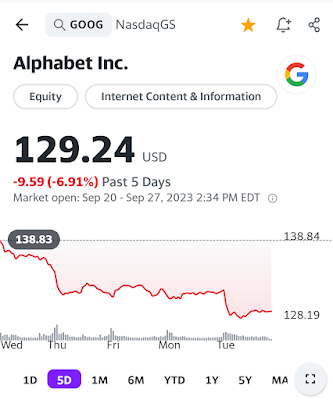I was planning to sell some of my Google shares (GOOG) by the end of this month. Just a few more days to go for the end of the month, but all of a sudden, GOOG has fallen by about 7% in the last 5 days.
I already had to change my plans once because Google share prices fell badly right before I was going to sell them. Now this is the second time within a year where my plans are changing because of price movements.
Not everything is bad news, however. The way price moves up is also dramatic. See how rapidly the price has risen by the end of August only to fall again just as dramatically within a few weeks. (I also sold some shares at $138 when the going was good.)
The Motley Fool says this about growth stocks:
The price of a growth stock tends to be extremely sensitive to changes in future prospects for a company’s business. When things go better than expected, growth stocks can soar in price. When they disappoint, higher-priced growth stocks can fall back to Earth just as quickly.
GOOG being a growth stock means such high volatility is to be expected.
Not too long ago, I was afraid of losing the high growth that comes through Google shares. Now I am starting to appreciate the lower volatility that diversified stock portfolios (e.g. mutual funds) offer.
Takeaways for me
- Selling mutual fund units is far easier—emotionally speaking—than selling something as volatile as GOOG is.
- The more volatile an asset is, the harder it is to use it in financial plans.



No comments:
Post a Comment